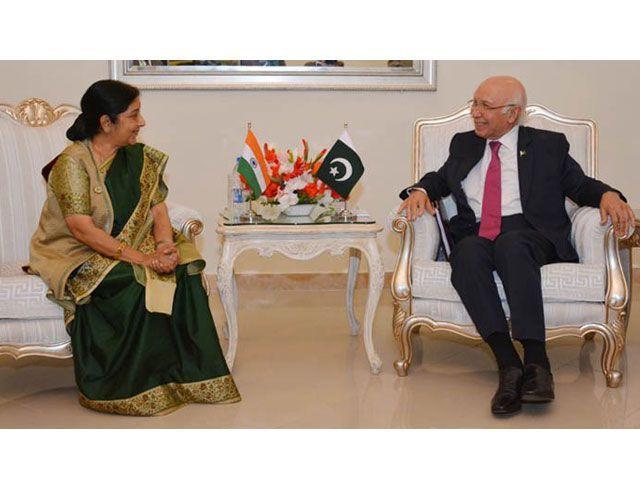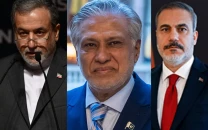Sartaj broaches cricket, Murree-II possibilities
Dismisses opposition’s criticism of Pakistan-India joint statement

Indian External Affairs Minister Suhsma Swaraj meets Adviser to PM on Foreign Affairs Sartaj Aziz in Islamabad on December 9, 2015. PHOTO: PID
The government on Friday hailed the resumption of dialogue with India as a breakthrough as the Prime Minister’s Adviser on Foreign Relations Sartaj Aziz dismissed the opposition’s criticism of the joint statement issued after the bilateral meeting between Indian Foreign Minister Sushma Swaraj and her Pakistani counterpart.
Aziz’s policy statement to the National Assembly came a day after the opposition and allies of the government had demanded that representatives of the public should be taken into confidence over the meeting and the Heart of Asia-Istanbul Process conference and associated meetings.
Taliban had leadership’s nod for Murree process, says Aziz
Describing the conference as a ‘great success’, Aziz said it had afforded Afghan President Ashraf Ghani the opportunity to visit Pakistan and break the ice between Islamabad and Kabul.
“President Ghani recognised Pakistan’s important role for peace in Afghanistan and emphasised the need for closer bilateral and regional collaboration to address the security and terrorism challenges being faced by Afghanistan,” Aziz said.
He added that the conference also recognised Pakistan’s contribution to regional and international efforts for stabilisation of Afghanistan and established its role as an important country for promoting peace and stability in Afghanistan, as well as the region.

Continuing Paris gains
Talking about the bilateral meeting with Swaraj and the subsequent announcement of the “Comprehensive Bilateral Dialogue” in the joint statement, Aziz said that it was an opportunity for both countries to continue the process which had been initiated in Paris.
Kabul-Taliban talks: a breakthrough
During the climate change conference in Paris on November 30, Indian Prime Minister Narendra Modi had approached his Pakistani counterpart Nawaz Sharif and both had a tete-a-tete in a casual atmosphere. That meeting had been followed by a surprise meeting in Bangkok between the National Security Advisors of both countries on December 6.
The adviser added that during Wednesday’s meeting, both sides had decided to continue that constructive engagement.
“As announced in the joint statement, the two sides agreed to a comprehensive bilateral dialogue to discuss peace and security, confidence building measures, Jammu and Kashmir, Siachen, Sir Creek, Wullar Barrage -- Tulbul Navigation Project, economic and commercial cooperation, counter-terrorism, narcotics control and humanitarian issues, people to people exchanges and religious tourism.”
India, Pakistan agree to resume comprehensive dialogue
“It was also decided that the two foreign secretaries will meet next month to work out the details of the comprehensive bilateral dialogue and the level of interaction in various working groups,” Aziz said. “The foreign secretaries will also decide the modalities and schedule of the meetings under the dialogue.”
Addressing questions on the implications of renaming the dialogue, Aziz said that it includes all the subjects of the composite dialogue, with some additions.
Further, he said that they had decided to let the NSAs discuss terrorism as part of the dialogue.
On the subject of the foundering bilateral cricket series with India, Aziz said that he had raised the issue with Swaraj at the dinner table who replied that since relations between the two countries were improving, it would ensure smooth cricketing between the two countries.
A spark of optimism
Murree II dialogue
Aziz said that the conference had also offered an opportunity to host multilateral meetings on furthering the peace process in Afghanistan.
In this regard, all four countries involved in the Murree peace process – Pakistan, Afghanistan, China, and the US – had agreed to devise a mechanism to resume the reconciliation process on a priority basis with a joint steering committee to oversee the process.
In the coming weeks, Aziz said, they will be working on implementing these decisions.
“It is too early to assess when Murree II can take place but at least the process of consultation will begin soon,” Aziz concluded.
Published in The Express Tribune, December 12th, 2015.



















COMMENTS
Comments are moderated and generally will be posted if they are on-topic and not abusive.
For more information, please see our Comments FAQ